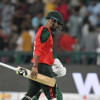Embargo, Islamophobia and neo-fascist retreat

Abolt from the blue has hit Bangladesh as if we didn't have a plateful on our hands already: SMS threats to some Christian bishops as Christmas approached, earlier attacks on a couple of them and attempted intimidation of the Shiites with the lethal bombing at Hussaini Dalan.
Australia, meanwhile, has embargoed air shipment from Bangladesh and four other countries on security grounds, effective from December 19. The Australian government circular places Bangladesh in the none-too-glorious company of Syria, Egypt, Yemen and Somalia!
The blanket label is another eye-opener to a sweeping profiling Bangladesh is being subjected to, for reasons best known to Down Under, though not an unknown tormentor of Bangladesh, if you jog your memory just a bit.
So you are bizarrely shaken now to a realisation that even our cargo is suspected of purveying danger along with that of some troubled countries!
But we should be keeping our wits about us to get to the bottom of what we regard as an undeserved sanction and therefore an unfair trade practice imposed on us unilaterally.
Waiver on certain items like mail and light cargo not exceeding 500 grams is too measly for the apparel exporters to be able to send out their samples by air.
It appears Australia is at it again – in its 'whistle-blowing' role, as it were! Public memory is still fresh on Australia's boycott of a cricket match series with Bangladesh citing security risks, roundly debunked by cricket celebreties like Shane Warne.
They played the World Cup round in Dhaka just because it was mandatory on their part to play out in return for the Bangladesh side having played their match in Australia earlier on. Even for that match you know too well how the Australian authorities had the shopping outlets strapped with the outer walls of the stadium fully cleared out.
Now touch-base with Islamophobia in the West. The anti-immigration voices were so long heard making a couple of points: One, the immigrants' non-assimilation in the host societies; two, assertion of their identities in isolation from the mainstream; and three, increasing potential of population growth among the Muslims. Now a new apprehension has entered into the equations or lack of them between immigrant communities and host societies: The fear of terrorism, especially after the Paris massacre.
You have the anti-immigration campaign group Pegida nicknamed 'patriots' in Germany brimming with almost an overpowering sense of victimhood and therefore frustrations against the immigrants. At the same time, colourful banners hang with the façade of a central opera house reading 'open your hearts' and 'The dignity of humans is sacrosanct' – quoting article 1 of the German constitution. A large white screen hanging at the front of the elegant building flashes the message 'We're not a backdrop for intolerance'; 'We're not a stage set for xenophobia.'
But at the close of count in December, Germany will have registered a record intake of 1 million refugees; that is a tribute to Angel Markel and German hospitality.
Move to Britain: Supporters of the British offshoot of German anti-Islamization group Pegida carried a banner picturing Winston Churchill with the slogan: 'No surrender to terrorists'. Fewer than 100 supporters waiving the union flag were met by anti-fascist counter demonstrators in two groups.
Britain has banned the National Front and the English Defense League for their bigoted and aggressive agenda going against the very grain of British belief system anchored in multiculturalism.
Just as you have the standout example of curry becoming the national dish of Britain, on the sides, you have Islamophobia in a US city inducing manhandling of a Sikh because of his beard, something Muslims are associated with.
The host society is perhaps erring on the side of caution. Khutbas delivered in Friday prayers are being translated into French or English just to comprehend the content and the madrasa curricula in Britain are being watched over. Imams of mosques needn't be recruited from countries of origin but picked up from amongst British Muslims, so it has been reported.
Elections in France and Spain have yielded interesting results.
In France, seven of the country's 13 regions have been won by the centre-right Les Republicains of former president Nicolas Sarkozy and their allies, five by the Socialists of President Francois Hollande and their allies, and none at all by the far-right Front National.
In the Spanish national elections, established parties Socialist and Conservative, have been replaced by new parties like Anti-Austerity and Centre Right. A coalition of Anti-Austerity, Centre Right and Socialist Fringe is likely to govern.
Having shared a global flavour, we turn to the home front focused on terrorism and extremism, the twin issues we need to address head-on perhaps for a long time to come.
The outlawed militant groups in the country are on and off surfacing in different forms. Our law enforcers detained three men on December 6, who were alleged to have been active members of the banned Jamaat-ul-Mujahideen. According to some reports, recent terrorist arrests in Bangladesh may have highlighted al-Qaeda threat in the country.
Much has been said, if not made, about the 34 country Saudi-led coalition against ISIS. An informational chart published in the Times magazine of USA, November 30 – December 07, 2015 was revelatory in a standalone fashion. It was titled: Why the world doesn't really want to destroy ISIS with the subtitle reading: Rhetoric hasn't matched action for most of the countries with an interest in the war against the terror group.
We pick four important country situations among 11 that have been described in brief to cobble a sense of what is being conveyed in the essence.
-- While Washington is putting more special forces troops in the region, President Obama has rule out ground troops.
-- Saudi Arabia has engaged in limited air strikes against ISIS in Syria but has been far more focused on their struggle with Iran and the civil war in Yemen.
-- Russia's main interest has been to prop up its main ally Asad.
-- Iran is more interested in battling Saudi Arabia in its regional, sectarian power struggle.
In the end, why chase a mirage of names? The terrorist organisations have mutated and changed sides, so, what's in a name?
A coherent message and argument based on the essence of world religions that is universally recognised holds the best answer to ideological extremism of any stripe.
The writer is Associate Editor, The Daily Star.

 For all latest news, follow The Daily Star's Google News channel.
For all latest news, follow The Daily Star's Google News channel. 








Comments